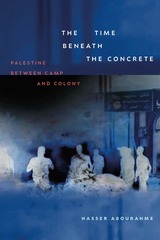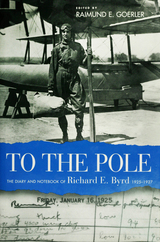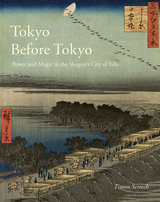4 books about Pyle, Robert Michael

Nature's Fading Chorus
Classic And Contemporary Writings On Amphibians
Edited by Gordon L. Miller
Island Press, 2000
Naturalists in every age have been intrigued by frogs, toads, and salamanders. They have seen these amphibians in a variety of guises -- as beings with magical powers or implicit moral lessons, as the products of spontaneous generation, as heralds of the seasons, as evidence of evolution or material for biological experiments, or, most recently, as ecological barometers for the biosphere.Nature's Fading Chorus presents an anthology of writings on amphibians drawn from the entire Western natural history tradition, beginning with Aristotle's Inquiry Concerning Animals written in the fourth century B.C.E., and continuing through recent scientific accounts of the relatively sudden -- and alarming -- global declines and deformities in amphibian species. The offerings not only reveal much about amphibian life, but also provide fascinating insight into the worldviews of the many writers, scientists, and naturalists who have delved into the subject.The book is divided into five sections. The first three offer selections from the most influential contributors to the Western canon of natural history writing, and contain classic texts that illustrate central themes in the changing understanding of amphibians and of the natural world. The fourth section offers engaging essays by leading twentieth-century nature writers that portray a variety of amphibians in diverse terrains. Part five covers the various aspects of, and research on, the problem of amphibian declines and deformities. Featured are more than thirty-five pieces, including works from Pliny the Elder, Gilbert White, William Bartram, Henry David Thoreau, Charles Darwin, T. H. Huxley, Loren Eiseley, Stephen Jay Gould, George Orwell, Annie Dillard, Terry Tempest Williams, and many others.Arranged chronologically, the writings provide an intriguing look at the ways in which humankind's understanding of its place in nature has changed through the course of Western history, and of the niche amphibians have occupied in that evolution.
[more]
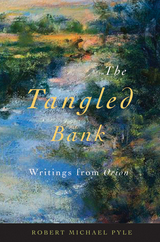
The Tangled Bank
Writings from Orion
Robert Michael Pyle
Oregon State University Press, 2012
“It is interesting to contemplate a tangled bank, clothed with many plants of many kinds, with birds singing on the bushes, with various insects flitting about, and with worms crawling through the damp earth, and to reflect that these elaborately constructed forms, so different from each other, and dependent upon each other in so complex a manner, have all been produced by laws acting around us…” —Charles Darwin, The Origin of Species
Robert Michael Pyle’s popular “Tangled Bank” column appeared in fifty-two consecutive issues of Orion and Orion Afield magazines over eleven years. Each essay collected in The Tangled Bank explores Charles Darwin’s contention that the elements of such a bank, and by extension all the living world, are endlessly interesting and ever evolving.
Robert Michael Pyle’s popular “Tangled Bank” column appeared in fifty-two consecutive issues of Orion and Orion Afield magazines over eleven years. Each essay collected in The Tangled Bank explores Charles Darwin’s contention that the elements of such a bank, and by extension all the living world, are endlessly interesting and ever evolving.
Pyle’s thoughtful and concise narratives range in subject from hops and those who love them to independent bookstores to the monarchs of Mexico. In each piece, Pyle refutes “the idea that the world is a boring place,” sharing his meticulous observations of the endless and fascinating details of the living earth.
[more]
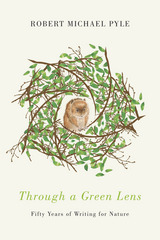
Through a Green Lens
Fifty Years of Writing for Nature
Robert Michael Pyle
Oregon State University Press, 2016
By an early age, Bob Pyle discovered that he had a greater facility with words than with numbers. In school, he found he could get good grades and win essay contests by relying on those words alone. But he wasn't really moved to write until a powerful experience in the summer he graduated brought his pen together with his passion for the natural world, and his first heartfelt essay came out as a revelation.
Thus began a life path devoted to natural history, nature conservation, and the language, and how they all meet in the literature of the land. Working in a succession of far-flung jobs in biological conservation, teaching, and field research, Pyle eventually threw in a regular paycheck in favor of a freelance existence devoted to his mutual passions for nature study and writing.
All along, he wrote, and wrote: to date, twenty books and hundreds of essays, stories, papers, and poems. But it is the occasional prose--the deeply personal essays that explored and indulged his immediate fascinations--that make up this selection of never-before-collected testimonies. Beginning with that 1965 cri de coeur written on mountain motel stationery, Through a Green Lens ranges across broad territory of topic, vehicle, geography, populace, and politics, concluding with powerful forewords for two 2015 books, Earth and Eros and Nerves and Numbers. Pyle's half-century long view, acute and uncommonly attuned to the physical world, gives readers a remarkable window on the natural setting of our life and times.
Thus began a life path devoted to natural history, nature conservation, and the language, and how they all meet in the literature of the land. Working in a succession of far-flung jobs in biological conservation, teaching, and field research, Pyle eventually threw in a regular paycheck in favor of a freelance existence devoted to his mutual passions for nature study and writing.
All along, he wrote, and wrote: to date, twenty books and hundreds of essays, stories, papers, and poems. But it is the occasional prose--the deeply personal essays that explored and indulged his immediate fascinations--that make up this selection of never-before-collected testimonies. Beginning with that 1965 cri de coeur written on mountain motel stationery, Through a Green Lens ranges across broad territory of topic, vehicle, geography, populace, and politics, concluding with powerful forewords for two 2015 books, Earth and Eros and Nerves and Numbers. Pyle's half-century long view, acute and uncommonly attuned to the physical world, gives readers a remarkable window on the natural setting of our life and times.
[more]

Thunder Tree
Lessons from an Urban Wildland
Robert Michael Pyle
Oregon State University Press, 2011
READERS
Browse our collection.
PUBLISHERS
See BiblioVault's publisher services.
STUDENT SERVICES
Files for college accessibility offices.
UChicago Accessibility Resources
home | accessibility | search | about | contact us
BiblioVault ® 2001 - 2025
The University of Chicago Press


